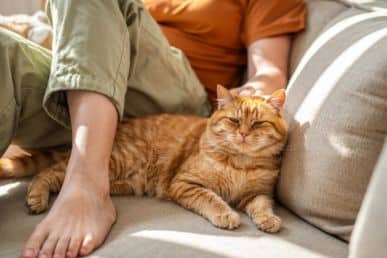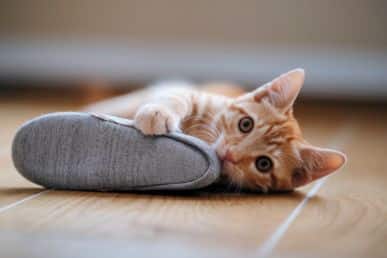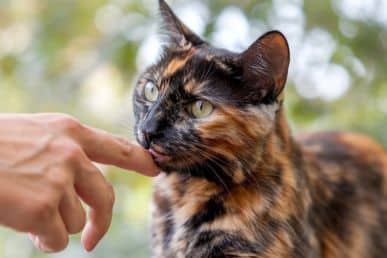Why does my cat bite my nose? 8 Secret Causes Exposed
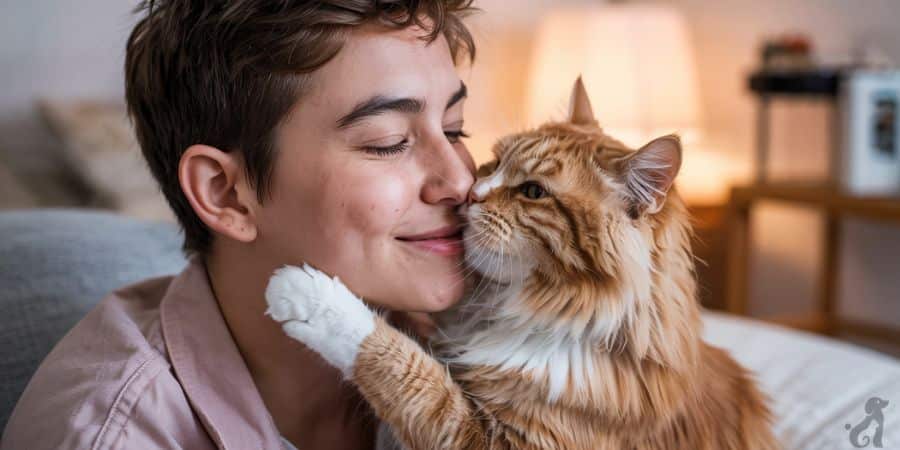
There you are, enjoying a peaceful snuggle with your feline friend, when suddenly, tiny teeth latch onto your nose! This quirky behavior could mean anything from ‘Let’s play!’ to ‘Give me space!’—and sometimes, even ‘I’m trying to help you relax.’
Cats have their own secret language: a nibble might look like aggression, but paired with a purr, it’s their version of a love note.
When my cat first chomped my nose, I panicked—until I realized her playful tail flicks meant she was inviting me to a game of ‘catch the finger.’
But not all nose bites are created equal. A gentle nip during cuddle time? Probably affection. A sudden chomp mid-petting?
They might be saying, ‘Enough!’ Decoding these moments requires watching for clues in their body language, environment, and even their daily routine.
Want to decode your cat’s secret message? Let’s dive into the 8 reasons your cat targets your nose—and how to respond to keep both of you happy.”
Understanding Cat Behavior
If you’re a cat parent like me, you’ve probably found yourself wondering why your cat suddenly bites your nose during quiet moments.
These nibbles might seem odd, but they’re usually how our feline companions choose to express their affectionate side. Each cat is different — some are playful, others more reserved — but all have their own quirks.
Whether it’s a sleepy tabby curling up for a cuddle or a quick nip after a long day, cats are animals with deep personalities and a wild nature that sometimes shows through. What feels like a bite might be a gentle signal of love, curiosity, or even a need for attention.
To understand this better, watch for body language:
- Twitching tails, dilated pupils, or soft nips could be a clue they’re overstimulated.
- Some cats make their owners a target of their excitement, especially if they lack enough playtime.
Try redirecting that energy with toys instead of letting your fingers or nose take the hit. My tabby used to nibble during play, but once I introduced more toys, the nose attacks stopped.
These little hunters often act on instinct, and with the right understanding, we can gently prevent unwanted bites while strengthening the bond through fun interactions.
It’s about embracing what makes each cat so unique — their mysterious, loving ways and the deep connection they build with us. After all, embracing their unique quirks is part of sharing life with these mysterious, affectionate little hunters.

The 8 Reasons Why Your Cat Bites Your Nose
We have been living with cats for the past several years and like you, we also have to face the nose-biting behavior of cats.
Since it is a normal thing for us and we also know the reasons for it, it does not bother us much and we want you to know these reasons so that you can live a better life with your cat.
1. Your Cat Is Trying to Play
If your cat is biting your nose, don’t jump to conclusions. It’s very likely that your kitty is simply being mouthy and scratchy while in play mode. Young cats, especially, may not fully understand that a nip or a little bite can hurt.
When you’re holding your cat, and they bite your nose, they likely didn’t mean any harm. They are just wound up and ready to go wild, enjoying their playful energy. It’s their way of showing excitement or affection, even though it may feel a bit intense.
Cats often engage in playful biting or nipping as part of their natural behavior, especially when they’re habitually biting during fun times. If your cat does this, try to channel their energy into more appropriate play.
If they bite your nose unintentionally, it’s important to react gently and say no firmly, then put down your cat to show them that this behavior is not okay.
Over time, they will learn to stop biting and will likely stop after receiving consistent, clear guidance. Offering lots of attention and cuddles afterward helps them feel secure, reinforcing the idea that gentle play is fun while aggressively lashing out is not.

2. Your Cat Is Showing Affection
You might find it odd when your cat bites your nose, but don’t worry—this could be a sign of affection. Cats often interact with their humans in ways that show they feel comfortable, and a gentle bite is no different.
If your cat is calm and relaxed, it’s often a good sign that they are reciprocating the love you show them. Just like how cats may groom or scratch each other, a playful bite is their way of showing affection.
They might even scoop you up into their closest circle of comfort by holding you with a little nibble. If they’re ready to love, you’ll likely see them licking or gently biting as a way of saying, “You’re my pal.”
This behavior, though unexpected, is just a soft latch to their way of expressing love.
3. The Silent Warnings Your Cat Gives Through Nose Biting
When your cat bites your nose, it may not always be playful. Often, it’s a silent warning that they’re feeling overstimulated or that their boundaries are being crossed.
If your cat bites lightly and follows it with a hiss or a growl, they may be telling you to back off. This is their way of expressing that they need some space and don’t want to be petted anymore.
It’s important to pay attention to these behavioral cues, as they can escalate into a more aggressive scenario if ignored.
Your cat could also be attentive to the pressure they’re feeling—whether from being petted too much or from their environment causing stress.
They may flip from enjoying the attention to feeling irritated, especially when they’re overstimulated and have had enough.
Cats are known for their antics, but understanding their body language can help prevent a sudden play bite from turning into full-blown aggression.
If you’re not responsive to their needs or if you invade their space too much, they may react by using their claws or giving you a more forceful bite.
Always respect their mood and remember that it’s just as important to give your cat cuddles when they’re ready for it, not just when you decide. Understanding your cat’s need for consent in these moments is crucial to maintaining a healthy and enjoyable bond.

13 Signs Your Cat is Overstimulated
🐾 Dilated pupils
🐾 Flattened ears
🐾 Skin twitching
🐾 Tense body
🐾 Rapid tail swish
🐾 Head turn/movement
🐾 Unsheathed claws
🐾 Crouched position
🐾 Growling or hissing
🐾 Increased vocalization (meowing more frequently or loudly)
🐾 Restlessness
🐾 Scratching
🐾 Biting
4. Your Cat Could Be Reminding You That You Belong to Them
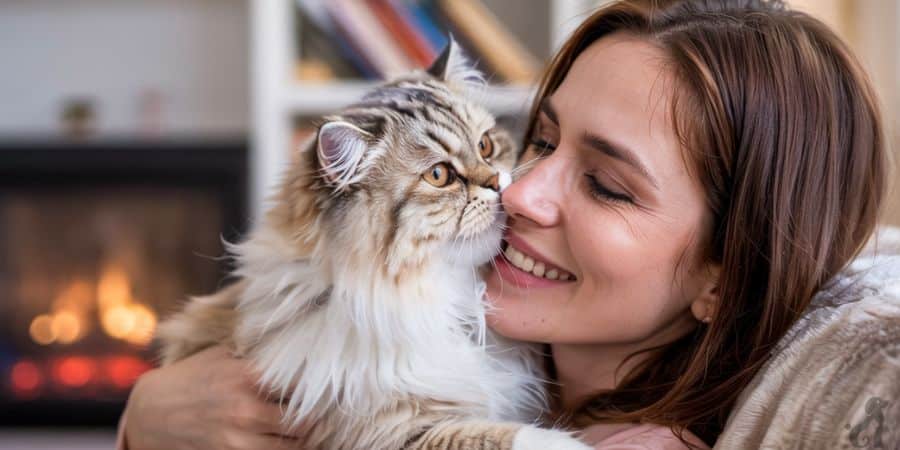
When your cat bites your nose, it might feel odd or even a bit painful, but there’s a deeper reason behind this behavior.
Cats are known for being very territorial creatures, and by rubbing their cheeks, chin, and even forehead on your face, they are essentially marking you with their scent. This is their way of saying, “You’re mine.”
Cats have special glands located around their paws and flanks, which they use to rub and mark objects or even other creatures. This act helps them claim territory and reminds everyone, including you, that you’re part of their personal space.
But why the bite? Well, it could be a playful warning or a form of bunting to further establish dominance.
When your cat gently bites your nose, it’s not necessarily aggressive; rather, it’s another form of nestling, just like when they rub against your legs or even nuzzle against your cheeks.
This behavior is similar to how cats interact with each other, leaving behind their scent to create a familiar, comforting space.
So, next time your cat nibbles on your nose, remember, they’re likely just reinforcing the fact that they belong to you — and you, to them.
5. It’s Simply the Most Accessible Place to Bite
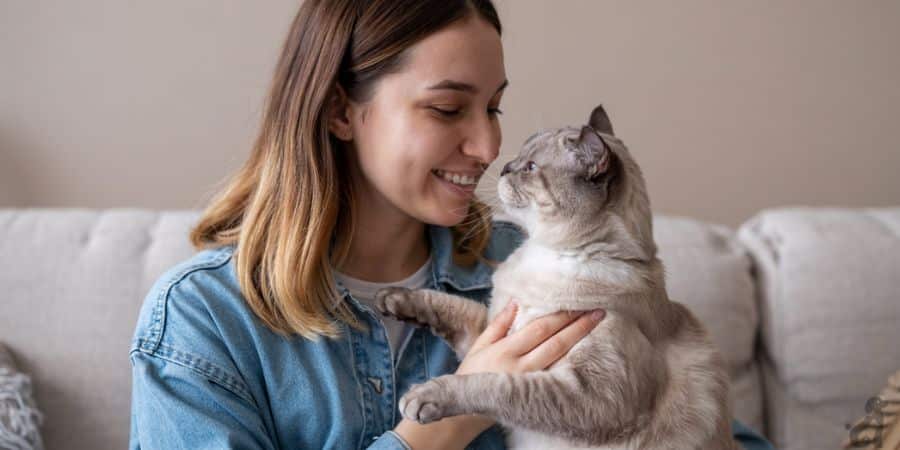
Your kitty might bite your face or nose simply because it’s the easiest spot to reach during playful moments. Cats often act frisky when they want attention, and your nose is an attractive target for gentle nips.
They might also knead nearby surfaces (push their paws against nearby objects or you!) while settling down, accidentally scratching your nose.
Though it’s hard to understand, this behavior isn’t meant—they see you as family and treat you like another cat! To stop this, set clear boundaries.
If your cat nips, say “no” firmly and gently create distance. Avoid rewarding the fuss with extra cuddles, as it might encourage them.
Sometimes, boredom fuels the biting, so keep them busy with toys. Remember, even the most lovable furballs need gentle guidance!
6. Your Cat Is Trying to Reduce Your Stress
When kittens are born, their mothers use soft licks to groom them. This helps the kittens feel calm and loved! Your grown kitty might copy this by gently biting your nose or giving you sandpaper licks (like tiny cat kisses!).
They’re giving you the same affection they’d show their litter (cat siblings) to soothe you. Think of it as a fuzzy way to say, “I’m here to help you relax!” Cats reciprocate feelings—if you’re stressed, they notice!
A soft nose nibble or lick is their way of comforting you, just like their mom did for them.
Sometimes, this is accompanied by purring or head bumps. So next time your cat “grooms” your nose, they’re not being weird—they’re being your tiny, furry therapist!
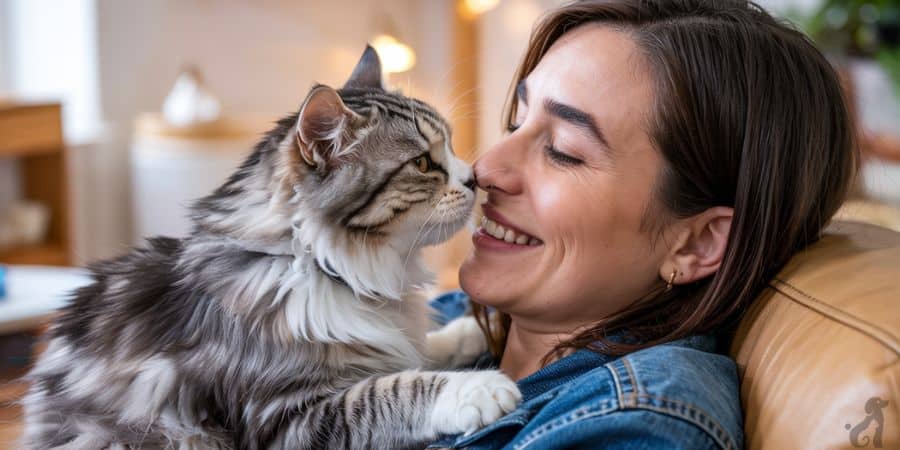
7. Exploring Potential Reasons
Cats often use their mouths to explore their environment, and your owner’s nose might seem like a fun, squishy toy! Young kittens nibble to learn about the world, and some adult cats continue this behavior out of curiosity.
A gentle bite could just be their way of saying, “What’s this?” If your cat biting hard feels aggressive, don’t panic! Most nose bites are not aggressive—they’re just exploring or playing. For example:
- A cat might lightly bite to test textures.
- Overexcitement during playtime could lead to stronger nips.
8. Fear, Stress, or Anxiety
Your cat might bite your owner’s nose if they’re feeling fearful, stressed, or anxious. Sudden changes in their environment, like a new pet, loud noises, or even rearranged furniture, can shake their sense of safety.
A disrupted routine (like feeding times or play sessions) might also leave them feeling uneasy. Cats often struggle to tell us when something’s wrong, so they express their discomfort through actions instead of meows.
Watch for signs like hiding under beds, excessive grooming, or biting hard during interactions. These behaviors scream, “I’m overwhelmed!”
An aggressive nibble on your nose could be their way of saying, “I need space!” While it’s easy to think they’re just being moody, these reasons are rooted in real emotions. By spotting these clues early, you can help your cat feel secure again—and save your nose!
Case Study: The Stressed Rescue Cat
- Scenario: Bella, a newly adopted rescue, bites the owner nose when loud noises occur (e.g., vacuuming).
- Problem: Fear-based biting triggered by environmental stress.
- Solution: Created a safe “zen zone” (quiet room with hiding spots) and used pheromone diffusers.
- Result: Bella’s nose-biting incidents dropped from daily to once a week.
- Key Takeaway: “Reducing environmental stress minimizes fear-driven bites.”
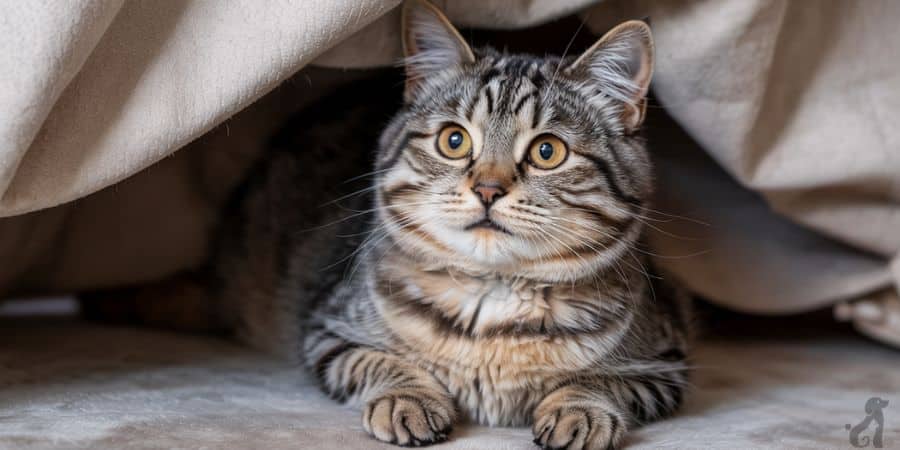
How to stop a cat from biting the nose? Important Tips
If your cat’s nose-biting behavior feels frustrating, you’re not alone! Many owners struggle to prevent this from happening.
The good news? With practical advice and smart prevention strategies, you can create a safe environment while teaching better habits.
From redirecting their focus to using positive reinforcement and consistent training, these tips will help you tackle the issue gently and effectively.
1. Practical Advice for Prevention
Understanding why your cat bites your nose is the first step to preventing it. Cats often bite during playtime or to seek attention. Here’s how to manage this behavior:
- Redirect their energy by waving a toy (like a feather wand) near them instead of your face. Swap your hand or nose for a soft object they can safely chomp.
- Keep playtime fun but calm. If things get rough, pause and walk away to discourage biting. Offering a treat when they’re gentle helps them learn!
Cats love plenty of stimulation. Rotate their toys regularly to keep things interesting. Watch for signs like purring or slow blinks—these show affection, not aggression.
My own cat used to nibble my nose when bored, but swapping in a crinkly ball encouraged her to play nicely. Remember, patience wins!
2. Redirecting Behavior
If your cat likes to bite your nose, it’s time to redirect their behavior! Cats often nibble out of playfulness or curiosity, but you can teach them better habits.
Start by keeping a toy nearby—like a stuffed mouse or feather wand—to swap for your nose. When they lunge, say “no” firmly and offer the object instead.
- A quick spritz from a spray bottle (aimed near them, not at them!) can discourage unwanted biting without harm.
- Stay consistent—always replace your nose with something they can chomp.
This helps your cat learn what’s okay to bite and keeps your nose safe!
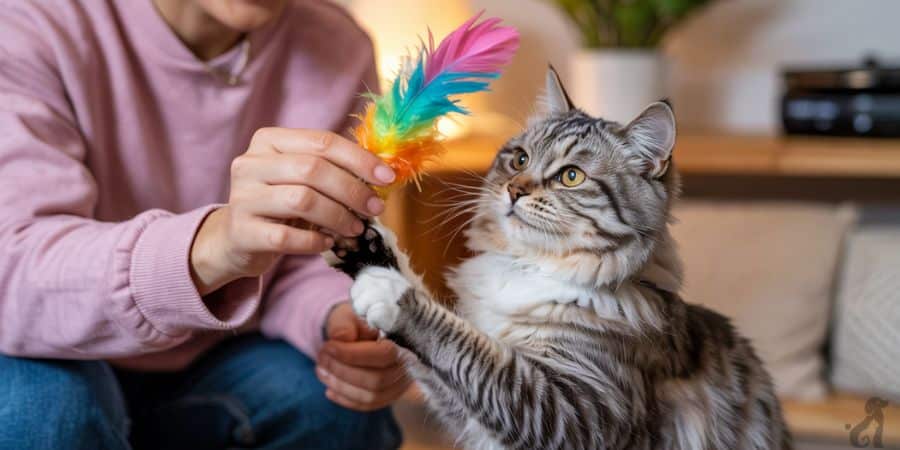
3. Positive Reinforcement Training
Positive Reinforcement Training is a fun way to teach your cat to prevent nose biting while building trust. Imagine your cat gently nudges you instead of biting—reward that good behavior right away!
A tiny treat or cheerful praise like “Good job!” helps them connect gentle actions with happy outcomes. I’ve seen this work with my own cat—when she licked my hand instead of nibbling, I’d immediately offer her favorite snack.
Over time, this reinforces positive behavior and makes biting less tempting. What if your cat bites? Stay calm—yelling can scare them. Instead, discourage negative behavior by gently pulling away and ignoring them for a minute.
Cats learn faster when they realize that biting means playtime stops. Pair this with rewards for being gentle, and they’ll start choosing snuggles over surprises!
4. Creating a Safe Environment
If your cat loves nibbling your nose, it might mean they need a better environment to stay happy and healthy.
Start by giving them toys to play with, like feather wands or crinkle balls, so they don’t see your nose as a target! Make sure they have a comfortable place to sleep, like a cozy bed or a sunny windowsill.
Keep their water fresh and their litter box clean—this helps them feel safe and relaxed.
When you follow these four tips, you can definitely stop your cat from biting your nose and build a strong bond with your cat.
Could It Be a Medical Issue?
The following are some medical issues that may cause a cat to bite your nose:
- Dental pain
- Arthritis
- Skin irritation
- Neurological problems
If the biting is sudden, aggressive, or paired with other symptoms (e.g., drooling, hiding, limping), consult a vet to rule out health concerns. Always prioritize a medical check before assuming it’s behavioral.
Why Does My Cat Bite My Nose When We’re Cuddling?
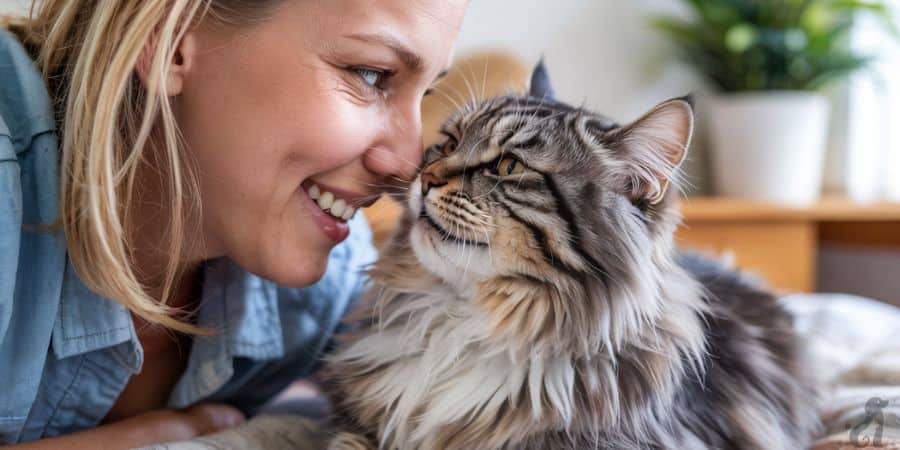
When your cat bites your nose during cuddling, it might seem confusing! Cats often show love by grooming, and a soft nibble on your face could be their way of being sweet.
They might sniff or gently nip to say, “You’re part of my household!” But sometimes, their intention isn’t so cuddly—they could be overexcited or sensing your mood. Your nose is an accessible part of your body when snuggling.
If your cat lunges suddenly, it might mean they’re done with cuddles. To encourage them to stop, avoid jerking away. Instead, guide their behavior by offering a toy for their hands or arms.
Teach children to watch for signs like twitching tails, which show discomfort. Remember, cats mix equal parts play and curiosity, so stay calm and patient!
Why Does My Cat Bite My Nose When We’re Playing?
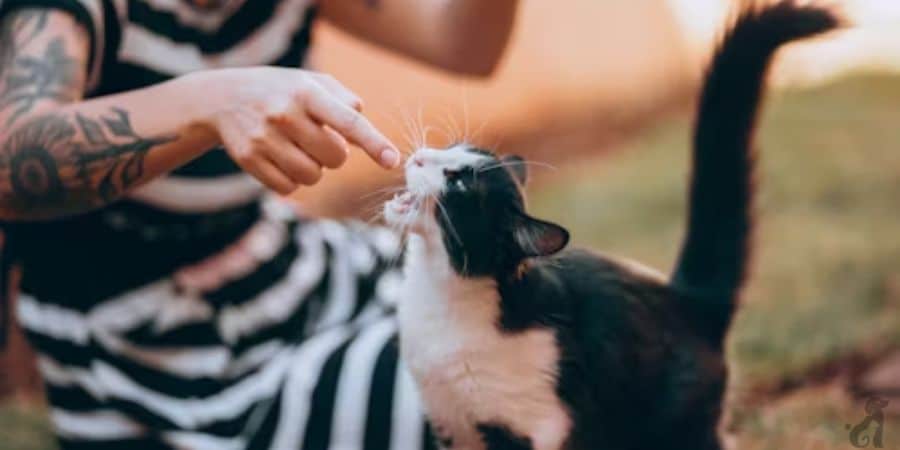
Your cat might bite your nose during playtime because they’re assuming your face is just another toy! When things get rougher, they could mistake your nose for something to pounce on, like pom poms or feathers.
I’ve noticed my own cat does this when she’s extra active—it’s her way of saying, “Let’s continue the fun!” But how do you dissuade them without making them upset? Try ignoring the nipping and stop play for a moment.
This sends a message that attacking your nose means the game stops. You can also dangle a wand or pole with strings to focus their attention elsewhere. Keeping a little distance from toys helps redirect their energy.
If your cat gets too rough, don’t worry—they’re not trying to hurt or harm you. It’s how they play with friends! My trick? Swap your nose for a feather toy and move on. Over time, they’ll learn what’s okay to chomp!
Best toys to redirect biting cats
- Interactive Wand Toys
- Puzzle Feeders
- Chew Toys (e.g., BiteyBox)
- Catnip-Infused Toys
- Vertical Scratching Posts
- Kickers
- Elevated Perches/Climbing Toys
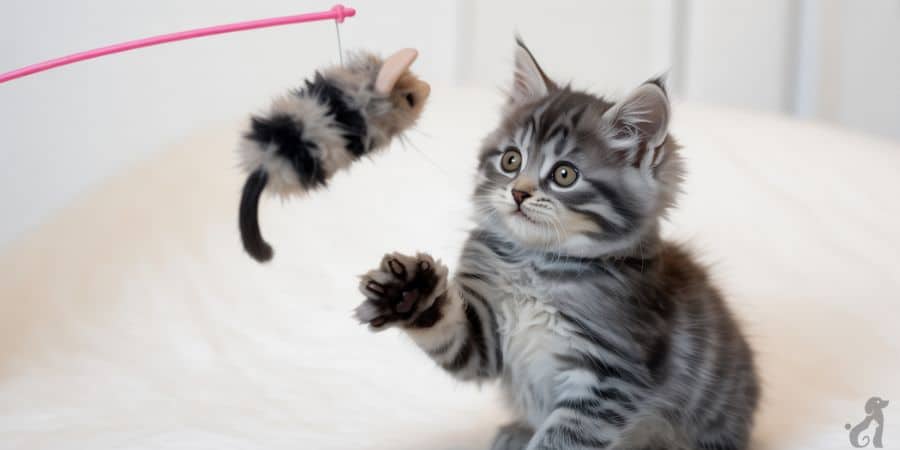
Why Does My Cat Bite My Nose When I Approach Them?
If your cat bites your nose when you get close, it might be because they’re feeling unsure or scared.
This is common in cats who were adopted from shelter cats or stray cats, especially if they came from abusive homes or traumatic environments.
These cats might see sudden movements as a threat and defend their space with hisses, scratches, or bites. It’s not always a behavioral problem—sometimes, it’s their way of saying, “I need time to trust you.”
A vet can help address whether your cat’s aggression is linked to physical health (like pain) or cognitive health (like stress). They’ll rule out issues and suggest ways to adjust their care.
For example, if your cat was treated improperly before, training them with patience can help. Start by letting them come to you first, and avoid forcing cuddles until they’re comfortable.
To eliminate friction in your relationship, create a calm new environment. Use toys for play to show you don’t mean harm. If the biting persists, a trainer or behavioral specialist might teach you tricks to acclimate your cat to your home and family.
Remember, cats from tough backgrounds need time to come to terms with love. Never punish them—it’ll only build mistrust. Instead, let them set the pace. With kindness, even the most nervous kitty can learn you’re not a particular person to fear!
Why Does My Cat Lick My Nose?
When your cat licks your nose, it’s not just being weird—it’s showing affection! Cats often use this behavior to bond with you, similar to how they groom other cats. Think of it like a little hug with their tongue!
Here’s what’s happening:
- Licking is a way to share trust and show they feel safe around you.
- Their mouth has a special organ called the Jacobson’s organ, which detects chemicals in scents. When they lick your face, they’re “reading” your scent to analyze how you’re feeling!
- This habit isn’t random—it’s a behavior cats have learned from kittenhood.
Why Does My Cat Sniff My Nose?
You know how cats love exploring the world with their sense of smell? Their tiny noses are like super-powered sniffers!
According to Dr. John Bradshaw, a cat expert, their olfactory detection system is a thousand times more sensitive than ours.
When your cat sniffing your nose, they’re collecting information about you, like what you ate or where you’ve been. They even use a special organ called the vomeronasal organ to detect pheromones, which are invisible odour messages.
Cats also greet others with nose-to-nose greetings to communicate friendliness. Those scent glands on their cheeks and around their nose release smells that say, “You’re family!”
When they sniff your nose, it might be their way of being affectionate or checking if you’re feeling okay. Your breath has unique chemicals that they find interesting! They’re curious about your environment and the aspects of your day.
Conclusion:
Cats use nose biting to communicate, not always out of aggression. Your feline friend might do this to show playfulness or seek attention.
If it’s a frequent occurrence, they could be triggering a reaction they enjoy, like your surprised yelp! Decipher their behavior by watching for signs—do they pounce after a lazy nap or during cuddle time?
Sometimes, they’re just unaware that nibbling hurts. Avoid overlooking these clues—what seems silly might be their way of saying, “Hey, play with me!”
How to Fix This Bad Habit
If gentle redirection (like offering a toy) doesn’t work, consult a professional behaviorist for advice. They’ll help you understand if stress or boredom is causing the new habit.
Never yell—it confuses cats. Instead, reward calm behavior with treats. Remember, patience is key!
Frequently Asked Questions
Why does my cat lick my nose and then bite it?
This “love bite” often starts as affectionate grooming but shifts to overstimulation. Watch for tail twitches or dilated pupils—it’s their cue to pause petting.
Why does my cat put his mouth on my nose?
Cats often use their mouth and nose to greet or sniff you. This identification helps them feel safe. A gentle nibble, like a love nip, can express affection or show liking. These actions mean they’re comfortable and want to bond with you.
Why does my cat like my nose so much?
Your cat may target your nose out of affection or instinct. In social groups, cats sniff to recognize members and express familiarity. Your scent makes them feel safe, so getting close is their natural way of showing love. This presence helps them know you’re part of their comfortable circle.
My cat only bites my nose when I wear glasses. Why?
Glasses reflect light or move unpredictably, triggering your cat’s prey drive. They likely see them as toys—try distracting them with a wand toy.
Why does my cat nuzzle me with her nose?
Your cat presses her nose against you because nuzzling is a common way to show affection. This gentle behavior helps her mark you with her scent, claiming you as territory. It’s also a sweet signal of trust, deepening your bond and creating familiarity between you.
Why does my cat bite my nose after I sneeze or cough?
Sudden noises startle cats, prompting a reflexive bite. It’s not personal—calmly reassure them afterward to ease their anxiety.
Why does my cat exhibit biting behavior specifically targeting my nose and face?
Cats may bite your nose or face to communicate. It could signal playful affection, frustration from overstimulation, or even mild aggression. Their behavior often reflects how they feel in the moment. For persistent issues, seek advice from a vet or animal behaviorist to understand their unique triggers.

